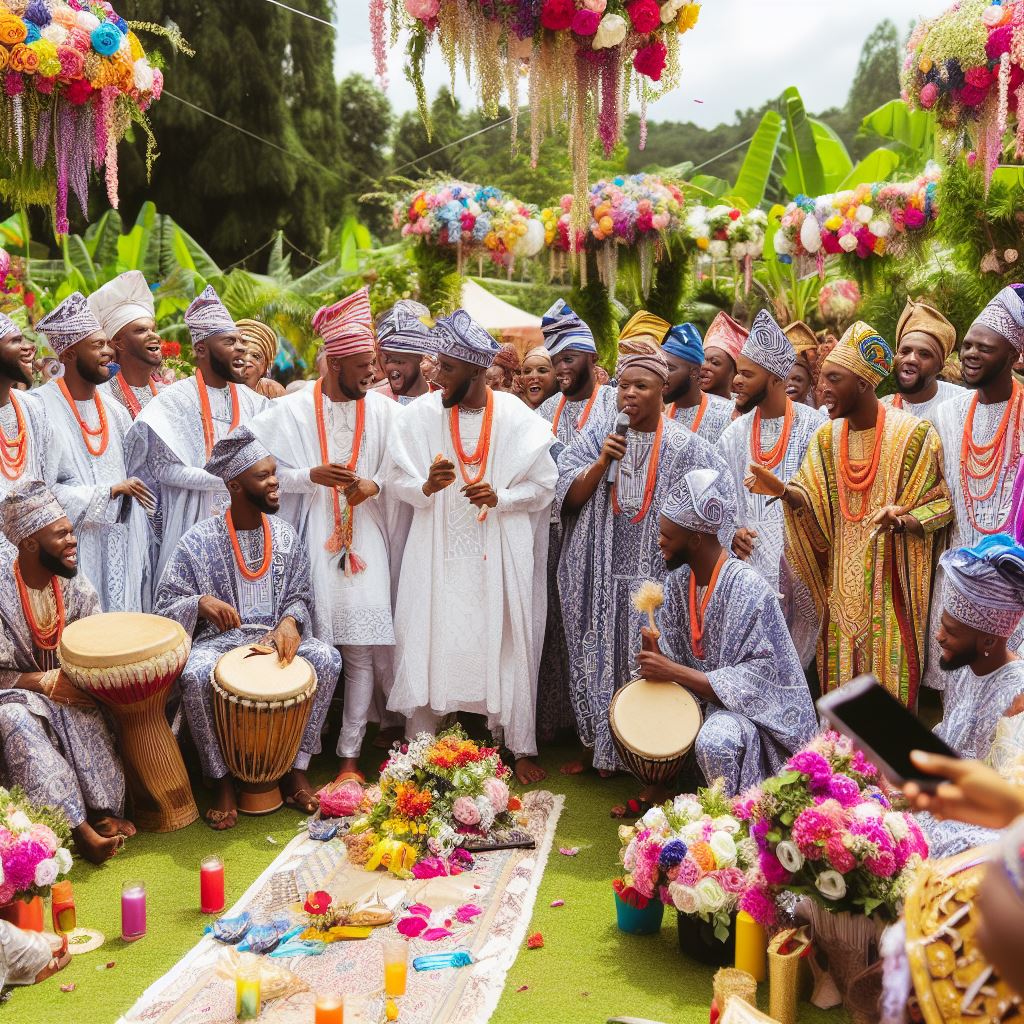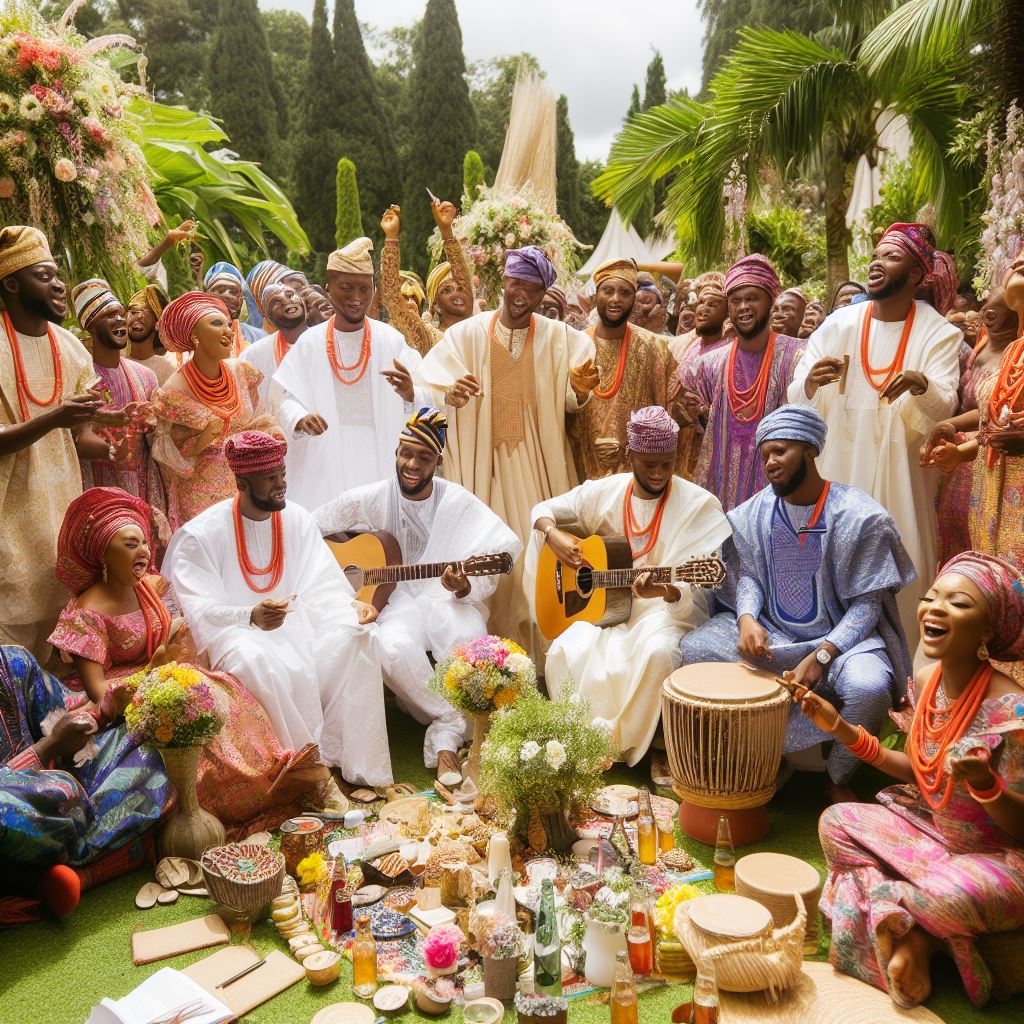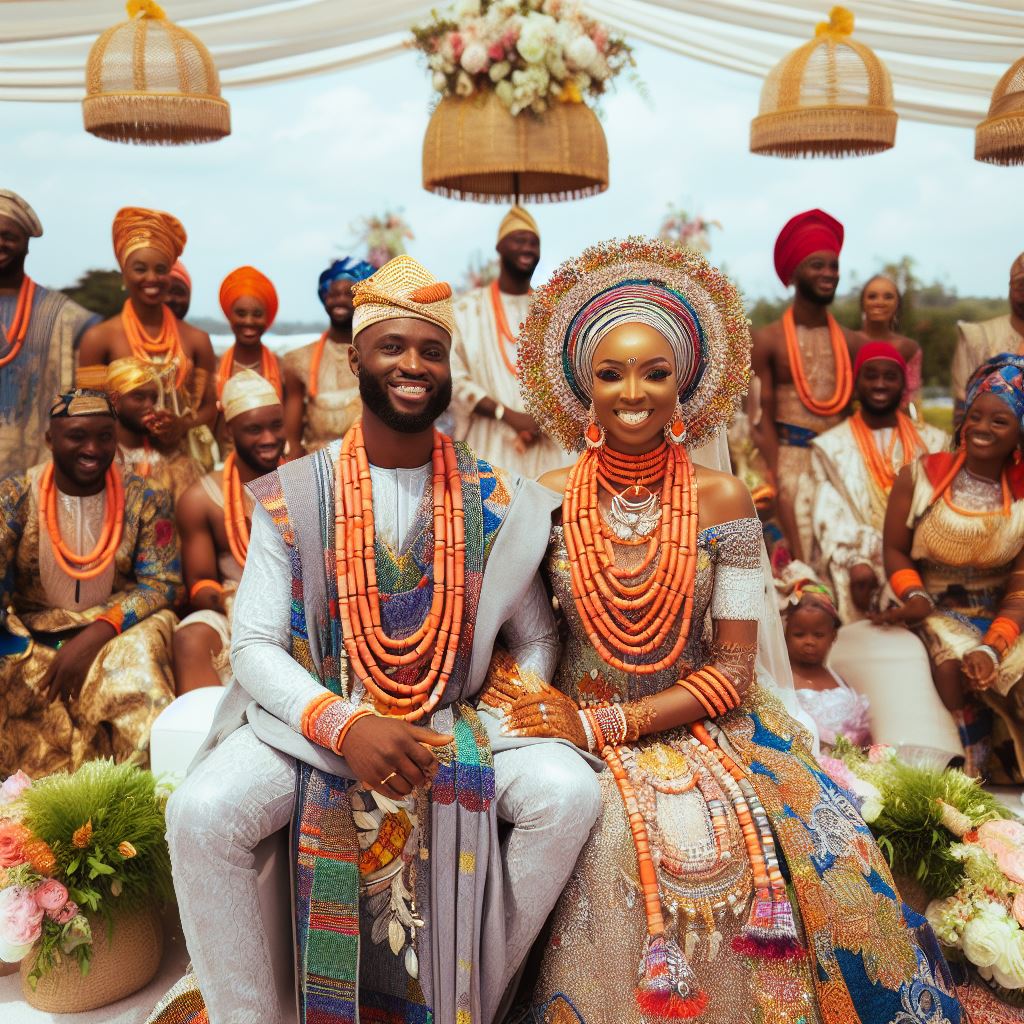Introduction
The importance of commitment in marriage
In Nigerian marital practices, commitment is of great importance for a successful marriage.
Honoring commitment in Nigerian marital practices is equally crucial for maintaining a healthy relationship.
Commitment in marriage is vital. It fosters trust and security, ensuring partners stand by each other in challenges.
It strengthens emotional bonds, enhancing communication and conflict resolution.
Commitment promotes long-term stability, allowing couples to weather storms and cherish moments of joy. It signifies a profound dedication to the relationship, reaffirming love and unity.
When commitment wanes, marriages may suffer from issues like infidelity, emotional distance, or instability.
A strong commitment involves ongoing effort, prioritizing the marriage, and adapting to changes as a team.
It assures partners they are each other’s unwavering support, deepening their connection over time.
In essence, commitment is the foundation upon which a lasting, fulfilling marriage is built.
It’s a promise to stay devoted, growing together through life’s journey, and celebrating the unique love that marriage offers.
Transition into the importance of honoring commitment in Nigerian marital practices
In Nigerian marital practices, commitment is paramount. It binds couples in enduring love, fostering trust, and unity.
Commitment ensures lasting, harmonious relationships that withstand challenges. Marriages based on commitment also serve as a cornerstone of family stability in Nigerian culture.
This commitment involves more than mere words; it’s demonstrated through loyalty, support, and fidelity.
It is seen as a duty and an obligation to the family and community, strengthening social bonds.
Nigerian marital customs often involve extended families, and commitment helps maintain the intricate web of connections and responsibilities.
The commitment in Nigerian marriages extends beyond just the couple; it’s a promise to their entire community.
In many Nigerian communities, marriage is not just about two individuals but two families coming together.
The commitment to making the marriage work is a source of pride and respect. In honoring commitment, couples contribute to the preservation of cultural values and traditions.
This deep commitment in Nigerian marital practices serves as a model for resilience, mutual respect, and enduring love.
Overview of Nigerian marital practices
Description of traditional marriage ceremonies in Nigeria
- Traditional Nigerian marriage ceremonies are rich in cultural rituals and traditions.
- The ceremony varies depending on the ethnic group and region in Nigeria.
- The process generally involves a formal introduction of the families and a negotiation of the bride’s dowry.
- Traditional ceremonies often take place in the bride’s family compound or a designated venue.
- Activities such as singing, dancing, and feasting are common during these festivities.
- The couple is adorned in traditional attire, reflecting their cultural heritage.
- Various symbolic items, such as kola nuts and palm wine, are exchanged between families to symbolize acceptance and unity.
- Traditional marriage ceremonies provide an opportunity to showcase local customs and traditions.
- They foster a sense of belonging, strengthening cultural identity and community bonds.
Emphasis on the significance of commitment in these ceremonies
- Commitment is a fundamental aspect of Nigerian marital practices and is highly valued.
- The couple’s commitment is symbolized through the exchange of vows and the wearing of wedding bands.
- Commitment is seen as the foundation for a successful marriage, ensuring stability and mutual support.
- In Nigerian culture, marriage is regarded as a lifelong commitment between two families.
- Breaking a commitment is seen as a betrayal and brings dishonor to the individuals and their families.
- The commitment made during the traditional marriage ceremony is believed to be sacred.
- It is expected that couples honor their commitment through good times and challenging situations.
- Commitment is emphasized to foster trust, respect, and loyalty within the marital relationship.
- Honoring commitments also extends to fulfilling traditional roles and responsibilities within the marriage.
- Nigerian couples are expected to prioritize the well-being of their family unit above personal desires.
- Commitment in Nigerian marital practices promotes stability in families and the wider community.
- It sets an example for future generations and upholds cultural values.
In fact, Nigerian marital practices are deeply rooted in tradition and emphasize the importance of commitment.
Traditional marriage ceremonies are an opportunity to celebrate cultural heritage and showcase local customs.
Commitment is valued as the foundation for a successful marriage, symbolized through vows and the exchange of wedding bands.
The significance of commitment extends beyond the wedding day and encompasses fulfilling traditional roles and responsibilities, fostering trust, respect, and loyalty.
By honoring commitments, Nigerian couples contribute to the stability of their families and communities while upholding cultural values for future generations.
Understanding commitment in Nigerian marital practices
The various elements that symbolize commitment in Nigerian marriages
Commitment plays a significant role in Nigerian marital practices.
It is deeply rooted in the cultural and societal fabric, shaping the way couples navigate their relationships.
Understanding the importance of honoring commitment is crucial in comprehending the dynamics of Nigerian marriages.
1. Exchange of vows
The exchange of vows is a pivotal moment in Nigerian weddings. It represents a public declaration of commitment between the couple.
During the wedding ceremony, the couple stands before their families, friends, and community to express their lifelong dedication to each other.
This solemn promise solidifies their commitment and sets the foundation for a strong and lasting union.
2. Payment of bride price
Another significant element highlighting commitment in Nigerian marriages is the payment of the bride price.
This practice involves the groom presenting gifts, usually in the form of money or goods, to the bride’s family.
The bride price signifies the groom’s willingness to take on the responsibility of caring for his bride and her family.
It symbolizes a commitment to honor and provide for his wife throughout their marriage.
3. Traditional rites and rituals
Nigerian marriages are often accompanied by various traditional rites and rituals that reinforce commitment.
These rituals vary across different ethnic groups but share a common goal of solidifying the bond between the couple.
From traditional blessings and prayers to ceremonial dances and symbolic gestures.
These customs emphasize the importance of commitment and ensure that the couple starts their married life on a strong foundation.
The cultural and societal expectations that reinforce commitment
Commitment in Nigerian marital practices is not just limited to the couple themselves.
It extends to the larger community and is embedded in cultural and societal expectations.
Nigerian culture places a strong emphasis on family, community, and collective responsibility.
In Nigerian society, marriage is seen as a union not only between two individuals but between their families and communities as well.
The commitment made by the couple is expected to transcend their personal desires and serve as an example to others.
This sense of collective commitment pushes couples to work through challenges, honor their vows, and prioritize their commitment to each other and the broader community.
Furthermore, Nigerian culture values the preservation of the family unit.
Divorce is generally discouraged and viewed as a last resort. Instead, couples are encouraged to find ways to work through their issues and maintain their commitment to each other.
This cultural expectation reinforces the importance of honoring commitment and encourages couples to invest time, effort, and resources into reconciling differences and strengthening their bond.
Essentially, commitment is a fundamental aspect of Nigerian marital practices.
Through the exchange of vows, payment of bride price, and various traditional rites and rituals, couples symbolize their commitment to each other.
These practices are reinforced by cultural and societal expectations, promoting collective responsibility and the preservation of the family unit.
Understanding and honoring commitment is vital for the success and longevity of Nigerian marriages.
Read: Divine Love: Scriptures that Reflect God’s Vision for Marriage
The Consequences of Not Honoring Commitment in Nigerian Marriages
The Negative Impact on Individuals and Families
- Broken promises in Nigerian marriages lead to feelings of betrayal and emotional distress.
- Not honoring commitment can result in a loss of trust between spouses in Nigerian marriages.
- When commitment is not upheld, it can lead to resentment and feelings of insecurity.
- Nigerian couples who fail to honor their commitments may experience frequent conflicts and arguments.
- Lack of commitment in marriages can lead to decreased intimacy and connection between partners.
- Children in Nigerian families may suffer from the consequences of broken commitments, leading to psychological issues.
- Neglecting commitment can have a devastating impact on the overall stability and well-being of Nigerian families.
- Individuals who do not honor their commitments often face social isolation and exclusion from their communities.
- The lack of commitment can lead to divorce and separation, causing financial and emotional burdens.
- Nigerian marriages devoid of commitment can create a cycle of broken relationships and mistrust for future generations.
The Implications for the Wider Community and Cultural Values
- When commitment is not valued in Nigerian marriages, it weakens the foundation of the entire community.
- The erosion of commitment in Nigerian marriages threatens traditional cultural values and beliefs.
- Not honoring commitments in marriages can negatively influence young individuals and future generations.
- Nigerian communities that prioritize commitment foster healthier relationships and stronger social bonds.
- Respecting commitment in marriages contributes to the preservation of Nigeria’s cultural heritage.
- Nigerian cultural values emphasize the importance of commitment in building strong families and communities.
- When commitment is valued, it promotes a sense of responsibility and accountability within Nigerian society.
- The absence of commitment in marriages can lead to a decline in social cohesion and collective well-being.
- Strong commitment in Nigerian marriages serves as a role model for younger generations, instilling positive values.
- Communities that uphold commitment in marriages experience higher levels of happiness and satisfaction.
Basically, not honoring commitments in Nigerian marriages has significant consequences on individuals, families, communities, and cultural values.
It leads to emotional distress, loss of trust, conflicts, and decreased intimacy within marriages. Children suffer psychological issues, and families face instability.
The wider community experiences a weakened foundation, erosion of cultural values, and a decline in social cohesion.
On the other hand, valuing commitment in marriages promotes stronger relationships, preserves cultural heritage, and fosters a sense of responsibility and accountability.
It is crucial for Nigerian society to recognize the importance of honoring commitments in marital practices to ensure the overall well-being and success of individuals, families, and communities.
Read: Defining Love, Commitment, and Unity in Nigerian Marriages

Benefits of honoring commitment in Nigerian marital practices
In Nigerian marital practices, it is of utmost importance to honor commitments for several reasons:
Strengthening the bond and trust between partners
- Honoring commitments builds trust and creates a strong foundation for the marital relationship.
- Partners who honor their commitments show loyalty and devotion to one another.
- Through honoring commitments, couples can rely on each other and develop a deep emotional connection.
- This trust and bond contribute to a healthier and more fulfilling marital life.
Fostering long-lasting and stable marriages
- Commitment is a key ingredient in creating marriages that can withstand challenges and difficulties.
- Partners who honor their commitments are more likely to stay committed to the marriage during tough times.
- It helps couples overcome obstacles together and grow stronger as a unit.
- By honoring their commitments, couples invest in their relationship’s longevity and ensure a firm foundation.
Preserving cultural heritage and values
- Nigerian marital practices are deeply rooted in cultural traditions and values.
- Honoring commitments aligns with these traditions and preserves the cultural heritage of the country.
- It reinforces the importance of commitment in Nigerian society and strengthens the bonds within communities.
- By upholding commitments, couples contribute to a society that values and respects marriage.
Honoring commitments in Nigerian marital practices has several benefits:
- Enhanced trust and a stronger bond between partners: Honoring commitments builds trust, loyalty, and emotional connection between partners, creating a strong bond.
- Long-lasting and stable marriages: Commitment contributes to building marriages capable of withstanding challenges and growing stronger with time.
- Preservation of cultural heritage and values: By honoring commitments, couples contribute to preserving Nigerian cultural traditions and values.
- Increased marital satisfaction: By honoring their commitments, couples experience greater satisfaction in their marriages.
- Improved problem-solving and conflict resolution: Honoring commitments encourages partners to work together to overcome obstacles and find solutions.
- Mutual support and growth: Honoring commitments allows couples to support each other’s growth and development throughout their journey together.
Generally, honoring commitment in Nigerian marital practices strengthens the bond between partners, fosters long-lasting marriages, and preserves cultural heritage and values.
The benefits include enhanced trust, stability, preservation of traditions, setting a positive example for future generations, increased marital satisfaction, improved problem-solving, and mutual support and growth.
Therefore, it is crucial to prioritize commitment in Nigerian marriages as it leads to happier and healthier relationships.
Read: Marriage Vows: Revisiting Biblical Commitment Verses
See Related Content: Parenting Disagreements: Aligning for the Kids
Challenges in Honoring Commitment in Nigerian Marriages
External factors that can strain commitment
In Nigerian marital practices, honoring commitment remains essential for the stability and longevity of marriages.
However, there are numerous challenges that couples face, which can strain their commitment to each other.
One of the external factors that can affect commitment is economic challenges.
Financial instability often leads to stress, disagreements over money matters, and resentment between partners.
These issues can gradually erode the commitment as couples struggle to align their financial goals and fulfill their responsibilities.
Another challenge is infidelity and trust issues. Cheating and dishonesty not only breach the trust between spouses but also cause emotional pain and turmoil.
Restoring trust is a delicate process and requires sincere efforts from both partners to rebuild their commitment and move forward.
Changing cultural dynamics also contribute to the difficulties in honoring commitment.
Modernization and globalization have introduced new values and expectations, which sometimes conflict with traditional cultural norms.
Balancing these dynamics can be challenging for couples, as they navigate between traditional practices and modern influences.
Suggestions for overcoming these challenges and maintaining commitment
Effective communication
Despite the challenges, there are several suggestions for overcoming them and maintaining commitment in Nigerian marriages.
Effective communication is crucial, as it allows couples to address financial, trust, and cultural issues openly.
By sharing their concerns, fears, and aspirations, partners can find common ground and strengthen their commitment to each other.
Couples counseling
Couples counseling can also provide valuable support in resolving conflicts and rebuilding commitment.
Seeking professional help allows couples to gain insight, learn effective conflict resolution strategies, and address underlying issues that may be hindering their commitment.
Reaffirming cultural values
Reaffirming cultural values is another vital aspect of maintaining commitment.
Embracing and honoring traditional customs can serve as a foundation for couples to navigate through changing dynamics and reaffirm their commitment to each other.
Building trust
Building trust is an ongoing process that requires transparency, loyalty, and forgiveness.
Partners should strive to be open and honest with each other, demonstrate loyalty, and be willing to forgive past mistakes.
Trust forms the glue that holds a committed relationship together.
Sharing responsibilities
Sharing responsibilities equally in the household and financial matters can help alleviate stress and promote commitment.
When both partners actively participate in the management of their home and finances, it fosters a sense of teamwork and reinforces their commitment to each other.
Continuous self-improvement
Continuous self-improvement is also vital in maintaining commitment. Individual growth and self-awareness contribute to a healthier and more committed relationship.
Each partner should strive to be the best version of themselves, continuously working on personal development.
Creating shared goals and aspirations
Creating shared goals and aspirations strengthens commitment in marriages.
By setting and working towards mutual objectives, couples find a sense of purpose and unity, which strengthens their commitment to each other.
Maintaining intimacy
Maintaining intimacy, both emotionally and physically, is crucial in sustaining commitment.
Regular affection, quality time spent together, and open expression of love and support nurture the bond between partners.
Seeking support from family and the community
Seeking support from family and the community can also provide guidance and encouragement during challenging times.
Having a strong social network allows couples to seek advice, gain perspective, and feel supported, ultimately helping them maintain their commitment.
Overall, honoring commitment in Nigerian marital practices may face various challenges, but by implementing effective strategies and seeking the right support.
Couples can overcome these obstacles and maintain a strong and thriving commitment in their marriages.
Read: Love and Commitment: The Core of Nigerian Marriages
Gain More Insights: Igbo Wedding Ceremonies: The Promise Behind Vows
Conclusion
Recap of the importance of honoring commitment in Nigerian marital practices
Honoring commitments in Nigerian marriages is crucial for strengthening bonds and ensuring lasting, harmonious relationships. It fosters trust, unity, and cultural preservation.
In Nigeria, marriage is not just a union of two individuals; it is a union of families, communities, and traditions.
This practice involves various customs, such as bride price payments, traditional ceremonies, and religious rituals, all emphasizing the significance of honoring commitments.
Additionally, marriage is seen as a social contract where both parties pledge their loyalty and dedication.
By upholding these commitments, couples contribute to the preservation of Nigerian cultural values and promote stability within their families and society.
Call to action for individuals to prioritize commitment in their relationships
Individuals must actively prioritize commitment in relationships for lasting happiness and fulfillment. This involves open communication, trust-building, and empathy.
Regularly showing appreciation and support nurtures emotional bonds. Avoiding distractions and being present during quality time together is crucial.
Acknowledging and addressing issues promptly prevents escalation. In times of conflict, active listening and compromise are essential.
Commitment entails dedicating time, effort, and understanding to nurture the connection.
By prioritizing commitment, individuals can build strong, enduring relationships that bring joy and satisfaction.
Final thoughts on the significance of commitment for a successful marriage in Nigeria
Commitment plays a pivotal role in achieving a successful marriage in Nigeria. It fosters trust, strengthens bonds, and sustains love.
Couples who prioritize commitment invest in open communication, resolving conflicts, and adapting to cultural dynamics.
This dedication transcends challenges, including cultural and societal pressures. It’s a resilient foundation for enduring love, nurturing families, and upholding traditional values.
In a country with diverse traditions, a commitment to understanding and respecting these differences fosters unity.
A committed marriage in Nigeria not only survives but thrives, setting an example for future generations and contributing to the stability of the family unit and society as a whole.




